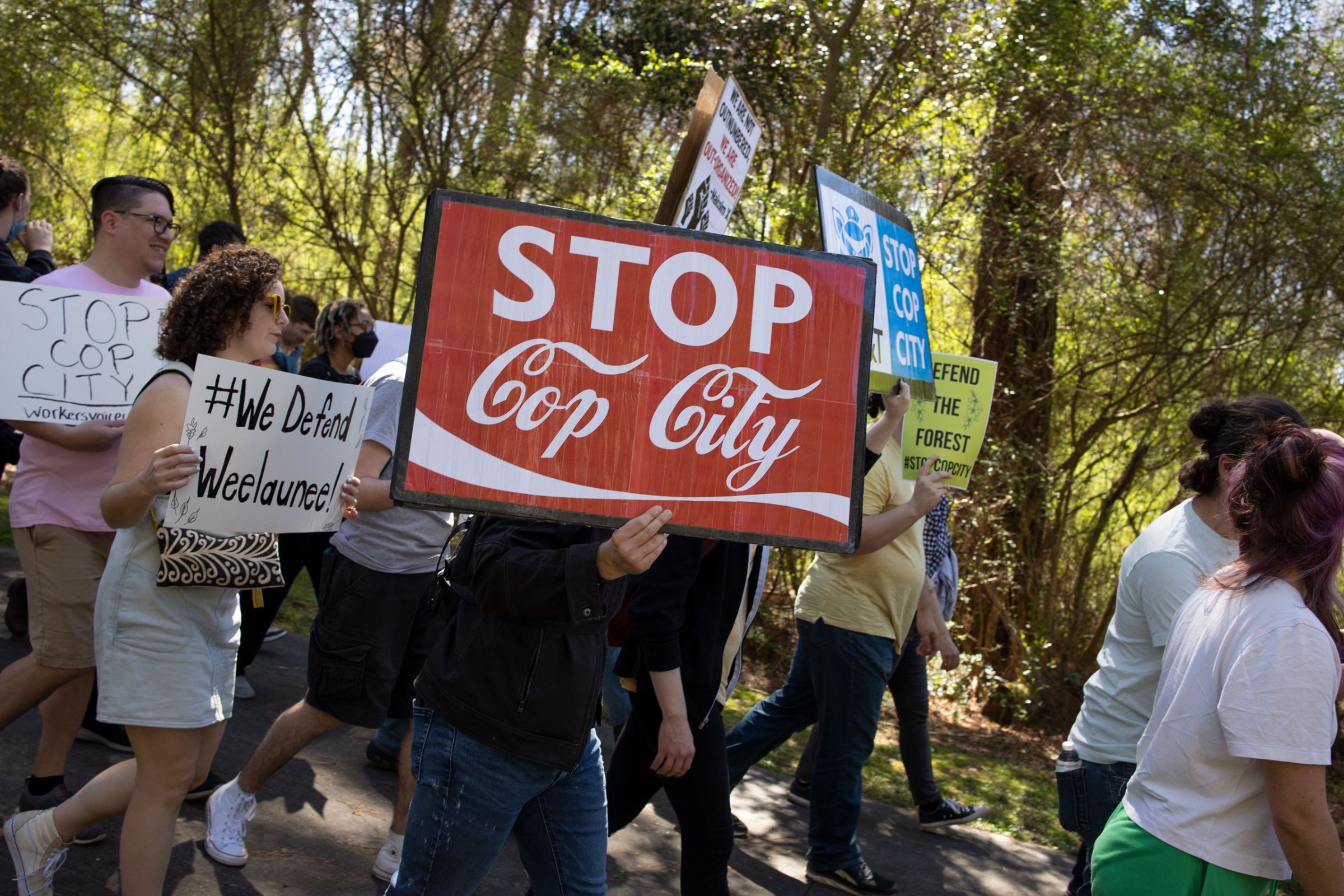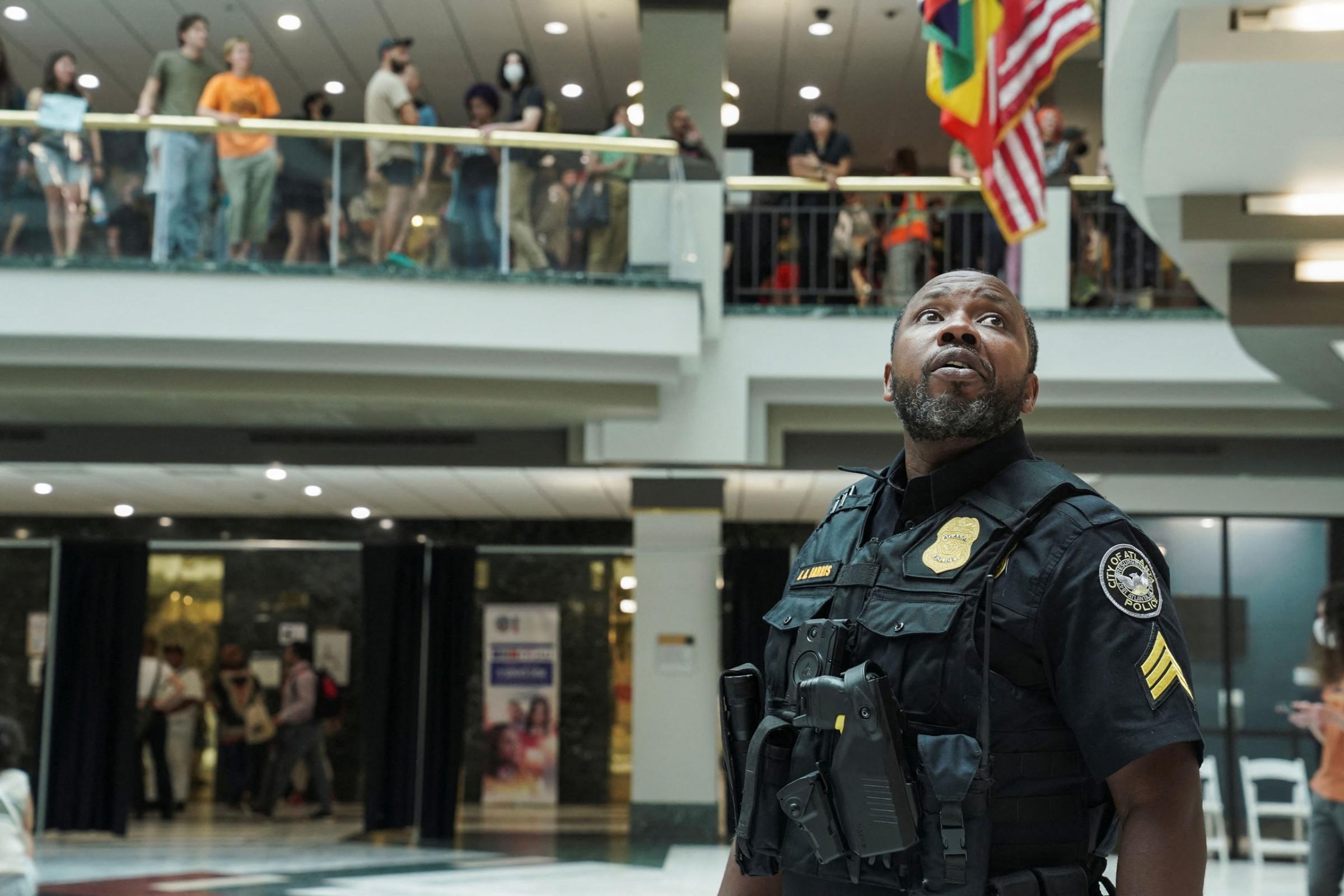
Atlanta’s city council voted early Tuesday morning to provide public funding for a controversial law enforcement training facility, cementing an unusual alliance that has formed between local Democrats and state Republicans. With the Democratic mayor, left-leaning city council and state Republicans all backing millions of dollars in taxpayer funds for the private non-profit that is building the center, the facility dubbed “Cop City” by opponents is set to take the next step towards construction, local political observers say.
Atlanta’s city council voted 11-4 in favor of allocating public funding to the facility after protesters packed the building and gave hours of heated public comment. In 2021, council members voted 10-4 to lease land to the Atlanta Police Foundation but not to provide money. The session began early Monday afternoon and members voted around 5:30 a.m. Tuesday.
More than 200 people spoke against the facility, saying it would militarize police and cost too much. “What you’re voting on today is a military facility to propose a compound to make a mock city for training in urban warfare tactics,” said Gary Spencer, senior counsel at the NAACP’s Legal Defense Fund. “The policing promoted by this facility will not make Atlanta safer; in fact, it will put our communities—particularly our Black and brown communities—in significant danger.”
Just a handful spoke in support of the project.
Supporters, led by Atlanta’s Democratic Mayor Andre Dickens, say the center is needed to properly train police and to replace dilapidated existing facilities. Last week, during his official state of the city address, Dickens argued that police training was key to reducing crime. “We need training facilities, and our police and fire training centers have been long condemned. That’s why we are building the state-of-the-art Atlanta Public Safety Training Center.”
The approval of local funding for the center is a blow to progressive protesters who have argued that it would empower police violence. Atlanta City Councilwoman Keisha Sean Waites voted no, even though she believes the state needs a new public safety training facility and supports law enforcement. She says the facility lacks community support and has a higher price tag than was initially stated. “There is no way in the world we should be supporting a measure that does not have the pulse of those people who sent us down here to represent their voice,” Waites says. “What I don’t understand is why there is this immediate need and urgency to do this. There is no reason why we have to do this on Monday.”
The months leading up to the funding vote have been tense. In January, police shot protester Manuel “Tortuguita” Terán 57 times, according to an official autopsy. Nearly 300 people spoke against the training center at a May 15 city council meeting; public comment lasted more than 7 hours. Taxpayers learned they will actually be paying close to $67 million to help build the facility—more than double the initial announced cost, as first reported by the Atlanta Community Press Collective. About $31 million in public money will be used to fund the site’s construction. The city will also pay $36 million over 30 years for using the 300 acres of forested land, which it leased to the Atlanta Police Foundation for $10 a year.
On Friday, lawyers for a ‘Cop City’ protester sued over the use of a state domestic terrorism charge in a case stemming from the protests, the Guardian reported. Last Wednesday, the Georgia Bureau of Investigations announced that it had arrested three members of a bail fund on charges of money laundering and charity fraud. The Atlanta Solidarity Fund had been providing financial relief for protesters, many of whom had been charged under domestic terrorism laws. Bond has since been granted for the three activists; a judge said he did not currently find the prosecution’s case “real impressive” after expressing concerns about their free speech rights.

‘Cop City’ critics and some attorneys and lawmakers fear that the charges against bail fund members are intended to chill protests and those who support them. State Sen. Josh McLaurin said he is concerned about the misuse of state resources. “The broad brush that was used to paint a large group of protesters as domestic terrorists months ago is now being further deployed to extend the reach of the criminal legal system to more people, even further out,” McLaurin says.
Attorney General Chris Carr has said authorities “will not rest until we have held accountable every person who has funded, organized, or participated in this violence and intimidation.”
Public resistance has not been enough to change the political reality in Atlanta, as the city council has backed funding for the facility. Atlanta City Councilman Michael Bond voted yes for the center. He says current training facilities are “dilapidated.” “It’s not just something that is glitzy and glamorous…that we want to do to appease the ‘police state,’” he says. “This is a real necessity for our city and it affects the recidivism rate in the police and fire department and harms recruiting the best and brightest.” Bond says that he condemns the death of the protester, as well as the raid of the bail fund.
While public hearings have largely showcased critics of the facility, a March survey by Emory University professors suggest that the views of Atlanta residents are mixed. Overall, 48% supported the training center, 46% opposed it and about 6% were not sure. However, the survey also reveals a racial disparity. “If you go into the more affluent northern parts of the city, like Buckhead, there are much higher levels of support, compared to lower income, more heavily Black neighborhoods in the southern part of the city,” says Zachary Peskowitz, associate professor at Emory University—one of the two people who conducted the study.
Interest in the facility increased when homicides spiked in 2020 and a concerned business community started to work with Atlanta’s mayor and city council to try and decrease crime, Peskowitz says. There has also been an active movement for the majority-white and affluent neighborhood of Buckhead to secede from the rest of Atlanta. “That concern may definitely have led some political leaders to be more enthusiastic about this facility,” he says. “Part of the motivation for this facility is to assuage corporate concerns about crime in the city—to say, here’s a concrete thing that we’re going to do to increase public safety.” For decades, left-leaning Black political leaders and business elites in Atlanta have shared a strong relationship, he adds.
For Michael Leo Owens, the second Emory professor who worked on the survey, any claims that the new facility will definitely increase or decrease public safety is “speculation.”
Atlanta has always had pro-police leanings, even among its Democrats, Owens says; it often defers to its more affluent population. “The ‘Atlanta Way’ is to exceedingly accede to the values, preferences, and wishes of its foremost commercial and philanthropic elites, both those based in and those based beyond the city’s limits,” Owens says.
Still, many left-leaning Democrats and ‘Cop City’ critics feel betrayed by the city’s stance on the project. “In every other space, these two factions claim to strongly dislike each others’ politics but they agree on the repression of protest,” says Tiffany Roberts, policy director at Southern Center for Human Rights, which is helping connect protesters with legal representation. “It all comes down to a so-called progressive man wielding conservative politics.”
More Must-Reads From TIME
- The 100 Most Influential People of 2024
- Coco Gauff Is Playing for Herself Now
- Scenes From Pro-Palestinian Encampments Across U.S. Universities
- 6 Compliments That Land Every Time
- If You're Dating Right Now , You're Brave: Column
- The AI That Could Heal a Divided Internet
- Fallout Is a Brilliant Model for the Future of Video Game Adaptations
- Want Weekly Recs on What to Watch, Read, and More? Sign Up for Worth Your Time
Write to Sanya Mansoor at sanya.mansoor@time.com